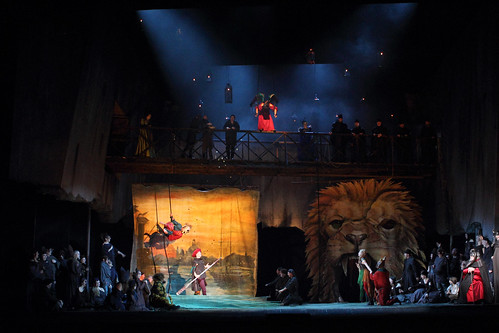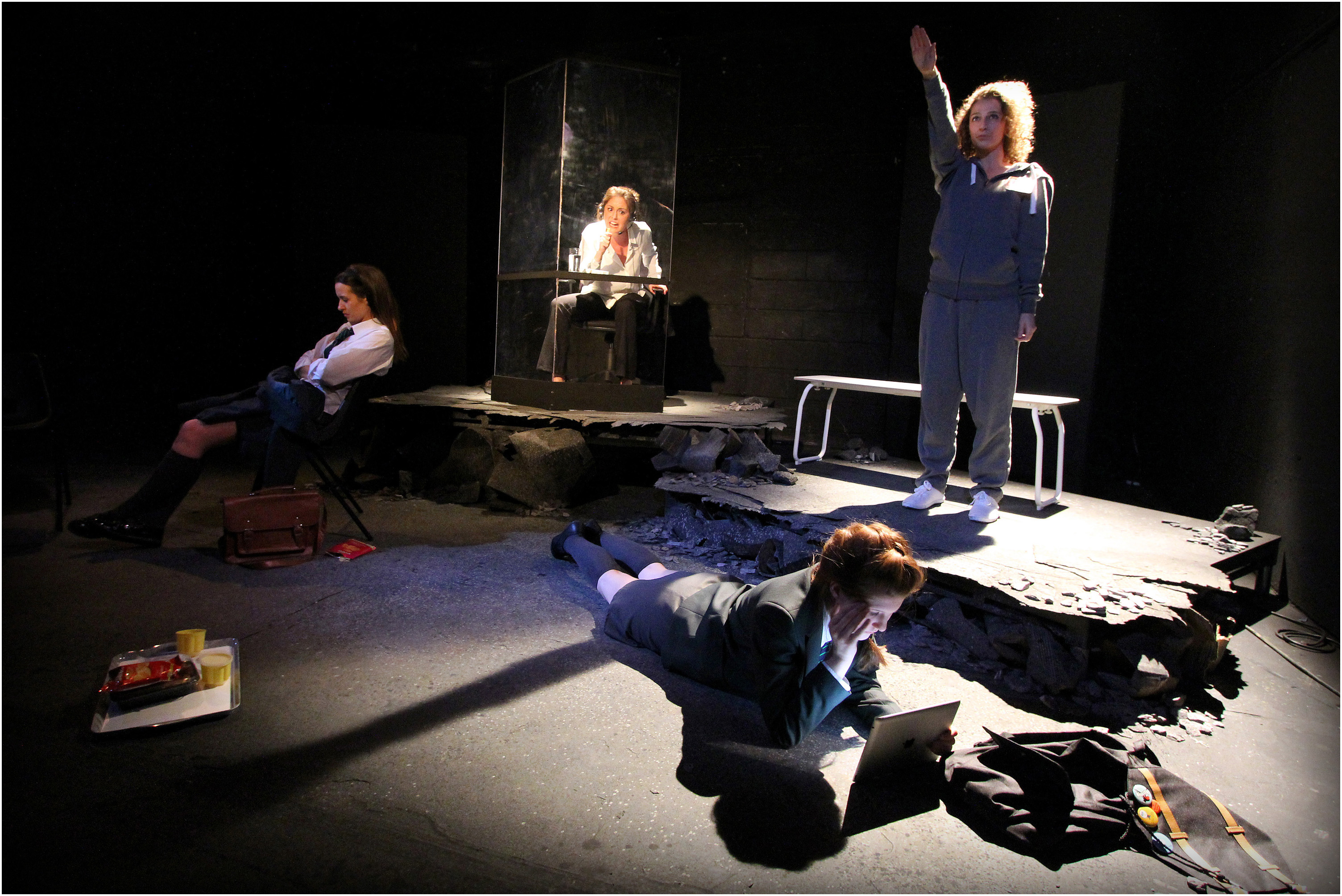By Mary Grace Nguyen
I Due Foscari is one of those opera
that isn’t performed often enough. Having seen it at the live relay in the
cinema [27th October 2014], nicely hosted by Stephen Fry, I managed
to learn more about Verdi’s earlier opera and unexpectedly enjoy it at the same
time. I disregarding what online reviews had said about the production.
It
was performed twenty years ago in Covent Garden and in 2012 the Los
Angeles Opera presented a newer production with Plácido
Domingo,
the company's general
director, to
sing the role of the baritone Doge of I Due Foscari. Yet, we know Domingo as a world
leading tenor from as far back as his opera career begun. In the 60s, he
auditioned for a baritone role in Mexico National Opera but was requested to read arias and lines in a
tenor range, which stayed with him ever since. In 2007, before deciding to take
on the role of the Doge, he announced his desire to sing as the baritone Simon
Boccanegra as well. So, the question on everyone’s lips is whether Domingo pulled off a
baritone role or not? (I’ll come back to this later.)
The
opera is based on true events, moreover a poem written by Lord Byron ‘The Two
Foscaris’ when Venice was going through a mercantile high; most of the gripping
action begins before the opera has begun. In the Royal Opera House’s production
director, Thaddeus Strassberger ensures the audience is up-to-speed with italic
captions projected onto a thin screen; a screen with video projections depicting
a green murky sea representing the depth and darkness of the Venetian waters: a
glimpse of a sinister Venice set in 1457.
As
designed by Kevin
Knight, these projections and stage sets denote the age of gloominess
where punishment was gritty, bloodier and monstrous. This wickedness is
represented through Strassberger’s use of battered and chained prisoners undergoing
physical harm and persecution: being burnt, spat on, loosing a finger, etc.
I Due Foscari is an emotional opera
that bases its sentiments on family pain and tragedy; there isn’t any hope
in sight. Verdi himself was going through his own personal trauma when his wife
and two children had died in the 1840s, roughly, the same time he was compiling
his musical score for I Due Foscari.
Parallels with his own family loss are evident in I Due Foscari where the Doge looses many sons, the last of which is
lost due to a warped and deeply corrupt justice system.
During
the interval Antonio Pappano gave glimpses into Verdi’s music discussing the
use of leitmotifs and Verdi’s decision to couple particular sounds and traits
to identify the three main characters. Throughout Pappano conducted in a way,
which conveyed his surging and imminent passion for the piece. From the moment
the overture begun, until the very end, Pappano persuaded the orchestra to play
notes with might and boldness and they managed to relish and hug Verdi’s
signature melodies delicately, instilling the betrayal, darkness and lingering
emptiness shown on the bleak and torturous-looking stage. The strings, violas and
cellos bring life and sensitivity to our family opera; yet this isn’t the type
of family opera you’d want to invite your children to see.
On the contrary, the
opening carnival scene in Act 3, which include fire-eaters and contortionists
felt a little out of place. We know Venice for being inventive with their
February Carnivale, yet this was a carnival scene that seemed to have gone
wrong. The thrill of a fun and social event was bundled up against a pitch-black
stage with the sadness and eerie prison scenes from the main storyline milling in
the audiences’ head; it was difficult to appreciate these scenes, entirely.
Domingo
himself was a wonder to watch. You can only view him by also remembering that
he is a legendary opera figure and his scarlet robes with red diamonds to
frame his head only enhanced this. Often I have noticed that Domingo’s eyes
water when he sings, which, I sense, is something he naturally does when he
takes on roles that require heart wrenching and passionate arias. His ability
to show a remorseful father was unbeatable. Domingo also being a father can
empathise on many levels with the feelings of the Doge (I am sure.) Yet, his
voice was still light and far from the baritone timbre expected for the Foscari
role.
In an interview with Hugh Canning in 2010 he said, “I don’t pretend to be a baritone. But
I always like to sing roles with different colouring” and this is something we may consider as:
(a)
He wants to create his own version of Foscari in Verdi’s opera (and perhaps
other baritone roles he decides to sing) or;
(b)
He admits he is not a baritone and is aware that what he is doing may offend many, but
wants to fulfil a life goal by singing baritone roles, of his choosing, irrespectively.
The
problem lies in fact that roles are laid out with designated vocal ability. If
we start making exceptions for world-leading figures now, where do we draw the
line should other singers want to do the same and do an unsuccessful job of
it? It may upset and cause controversy
with baritone singers yet somehow Domingo has managed to get away with singing
baritone roles. From the way I see it, Domingo isn’t a baritone singer (which
he acknowledges) yet sings roles in a different voice that makes it uniquely his own version of a role. It may seem like I am letting him off, but I was convinced of his
performance as the Doge that he had the heart and zeal of a sentimental
father.
As
Foscari, in his own terms, he was refined, depressed and lonely as a father; yet this portrayal doesn’t require a baritone voice. As far as the opera is concerned however,
perhaps, Verdi wanted Foscari to be sung as a baritone to carry the vocal
traits of an authoritarian and representation of justice and law. In which
case, Domingo’s tenor and non-existent baritone voice made his Daddy Foscari character more visible than his status as the Dodge as Domingo says, [he] ‘wears the mask of
the Doge a father’s heart beats within.’Domingo, at 73, has no plans for
retiring because, as he said in a recent interview, “I can still sing".
Jacopo
Foscari sung by Francesco Meli is another story. Jacopo’s qualities as an
innocent, and handsome, son and husband are finely crafted to Meli’s mellifluous and semi-angelic
voice. Despite having to sing in a cage
or in handcuffs, he seemed to have harnessed this discomfort well for we, the
audience, didn’t hear a vocal note of anguish besides his character’s final judgment:
accused of treason by the Council of Ten.
Maria
Agresta was very strong. In the first two acts of the opera, she is the most
consistent and tenacious as the wife, Lucrezia who tirelessly begs for a pardon
for her husband’s offence, which she never gets. Her voice never faltered and
in some moments sparked a teardrop in my eye.
Evil Loredan sung by the bass singer Maurizio Muraro
should also be credited for giving a hellish performance. I’d like to see him
as commendatore in Don Giovanni one day soon, please.
The
best scene however, goes to the very end where I found Domingo at his best.
Forced out of his top position after the death of his son, underpinning the opera’s
tragedy, Placido gives it all guts, tremble and glory with more tears in his
eyes as he falls on the ground. This was awkwardly, but subtly done
with Agresta shoving her son’s face under water conveying her ‘King Lear’
insanity and downfall. I am just a bit confused as to why Strassberger decided
to add this.
I
don’t consider myself a musicologist, (I stopped learning how to play the piano
at age 10), but I’d love to know how Verdi’s less-known opera is ‘structurally
flawed’ according to some critics. The music itself, in my opinion, was mesmerizing so, it's hard to understand this comment from experts. Also, to those who said that they felt that
the Strassberger’s staging was ‘static’, well, hate to be the bearer of bad
news but from a cinematic perspective, the movement of the cameras ensured we
saw different angles; there was a great deal of action so, I’m glad I settled for the
cinema viewing.
#ROHFoscari complete turn around at last scene from @PlacidoDomingo . Heart-felt, passionate and tragic.Chorus, #Agresta #Muraro full power!
— Mary Grace Nguyen (@MaryGNguyen) October 27, 2014
Last showing is Sunday 2nd November: Click here for more information.
(Photos courtesy of the Royal Opera House. I purchased my own ticket for the HD Live screening)












%2Band%2BBeverley%2BKnight%2B(Felicia%2BFarrell).%2BPhoto%2Bcredit%2BJohan%2BPersson.jpg)
%2Band%2BKillian%2BDonnelly%2B(Huey%2BCalhoun).%2BPhoto%2Bcredit%2BJohan%2BPersson.jpg)












